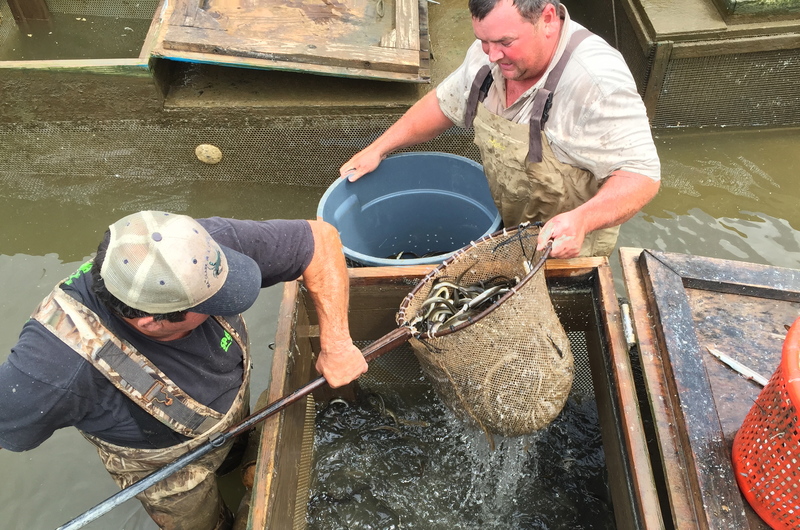Offloading eels in the upper Chesapeake for rockfish
Owen Clark culls dead eels from live eels in the live box where he keeps his catch while waiting for his New England buyer.
"There will always be some dead ones," he says, "but when the water up here gets hot like it is now - 90 in some areas - that's real hard on them. Last week we were pulling our pots out in the bay and there were seven or eight pounds of eels in each one. But a dead zone had come over them - no oxygen - and they were all dead."
Owen fishes out of Rock Hall in the upper Chesapeake. His 50-foot aluminum vessel - Aluminator - is a Deckelman, built up the Chester River a ways. Last I knew the operation was in Long Cove.
Jordan Clark - no relation - runs the Green Point Landing Marina where we launched Nellie Lankford Friday. "That's the beefiest boat fishing this end of the bay," said Jordan. Owen had his live boxes in the launching ramp and a buyer from up north had his blue-tanked truck backed down to the men. They dipped live eels out of the live box into green plastic trash cans and then handed them off to the buyer's men to dump into the truck's aerated tanks.
Owen said on this day he would be offloading about 1,500 pounds of eels. He didn't consider that much of a catch but apparently it's enough to keep diesel fuel in Aluminator's tanks.
I asked him what he attributed the dead zones to.
"Sewer plants," he said. "Too many nutrients in the bay and when we get the heat of summer, it takes all of the oxygen. Dead eels."
Owen said all these eels were destined for New England; Massachusetts to be more precise. There, he said, they would be sold to hook and line fishermen - recreational and commercial - who use them to catch the popular and aristocratic, silver- and black-striped bass. In the Chesapeake they call them rockfish. Rock Hall has something to do with rock fish. So too does Rock Hole, the former name of Millsboro in southern Delaware, near the headwaters of Indian River. Up that river, native Americans for centuries set fish traps - weirs - around bends and curves where they would corral spawning rockfish and spear them for their wonderful meat.
Indian River has also been a popular domicile for eels. Eels have long been a favored food for rockfish.
As for human consumption, eels smoke up as well as any fish I know. Their skin, under the influence of slow smoking, turns a shiny and golden hue, and the meat takes on a sweet flavor that washes down particularly well with either icy cold beer or chilled Chardonnay.

























































